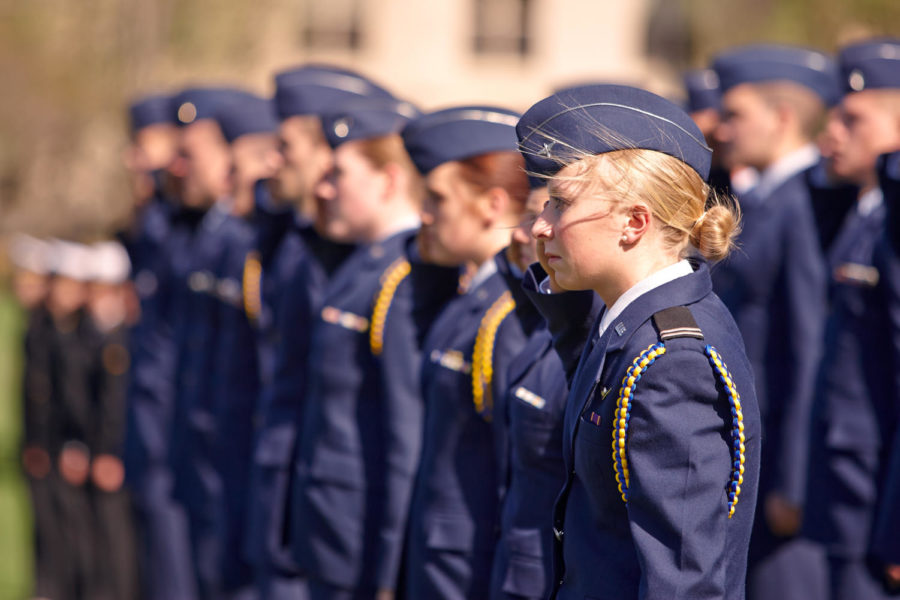ROTC cadets, midshipmen pass leadership roles
April 22, 2015
Rings of smoke rose over Central Campus as rounds from a Howitzer cannon thundered in the air April 22. For the first time, artillery rounds honored ROTC lead commanding officers and the guest of honor at this year’s Tri-Service Change of Command ceremony.
Cadets and midshipmen from the Air Force, Army and Navy ROTC units stood in formation in front of the Campanile while Army ROTC cadet Craig Stanley, senior in mechanical engineering, said an invocation prayer. Cadet Austin Dummer, senior in marketing, introduced the ceremony and cadet Cole Barbee, sophomore in interdisciplinary studies, sang the national anthem.
The formal ceremony was the official passing of command from current student commanders of each branch to the ones who will command next year. This is done by passing the guidon, each branch’s flag, from the current to incoming commander.
“Even though unit personnel come and go, the guidon remains,” Dummer said.
The passing of the guidon is a simple event, but contains the history and heritage of the branches, he said.
Air Force midshipman Sam Berndt, senior in aerospace engineering, passed the guidon to new wing commander Benjamin Shaffer, senior in civil engineering. Army cadet Chelsea Nicoletto, senior in biology, passed the guidon to new battalion commander Benjamin Brixius, junior in kinesiology and health. Naval midshipman Matt Sindelar, senior in mechanical engineering, passed the guidon to new battalion commander Levi Jorgensen, senior in industrial engineering.
Each branch does separate ceremonies for the fall command change and join together in the spring, rotating which branch plans the ceremony. This was the Army ROTC’s year to plan and took each branch’s traditions into account while planning.
Brig. Gen. William DeHaes, deputy adjunct general, was the guest speaker.
Leadership was the theme of his speech. One percent of the American population protects the freedoms of the other 99 percent, and leadership is expected in those positions, DeHaes said.
Lapses in core values by military members are magnified because of their position and what the country expects of them, he said.
“You pick up the paper any day and you can read core value breeches,” DeHaes said. “You all put a lot of trust in us as the military and it breaks a lot of that trust if we break our core values.”
Leadership begins with these core values, he said. He shared three other tenants of leadership including embracing diversity, valuing face-to-face communication and genuinely caring about the people being led.
The people someone leads become their “military family,” he said.
“Thank you for your willingness to serve the greatest military the world has ever known,” DeHaes said. “God bless you, and God bless America.”







